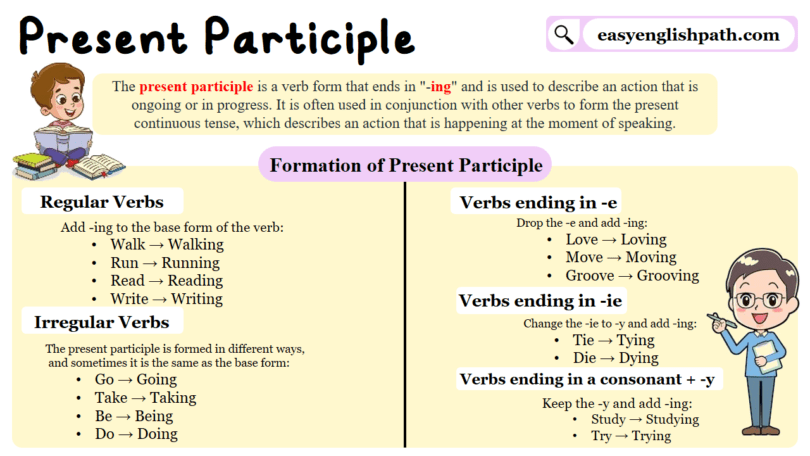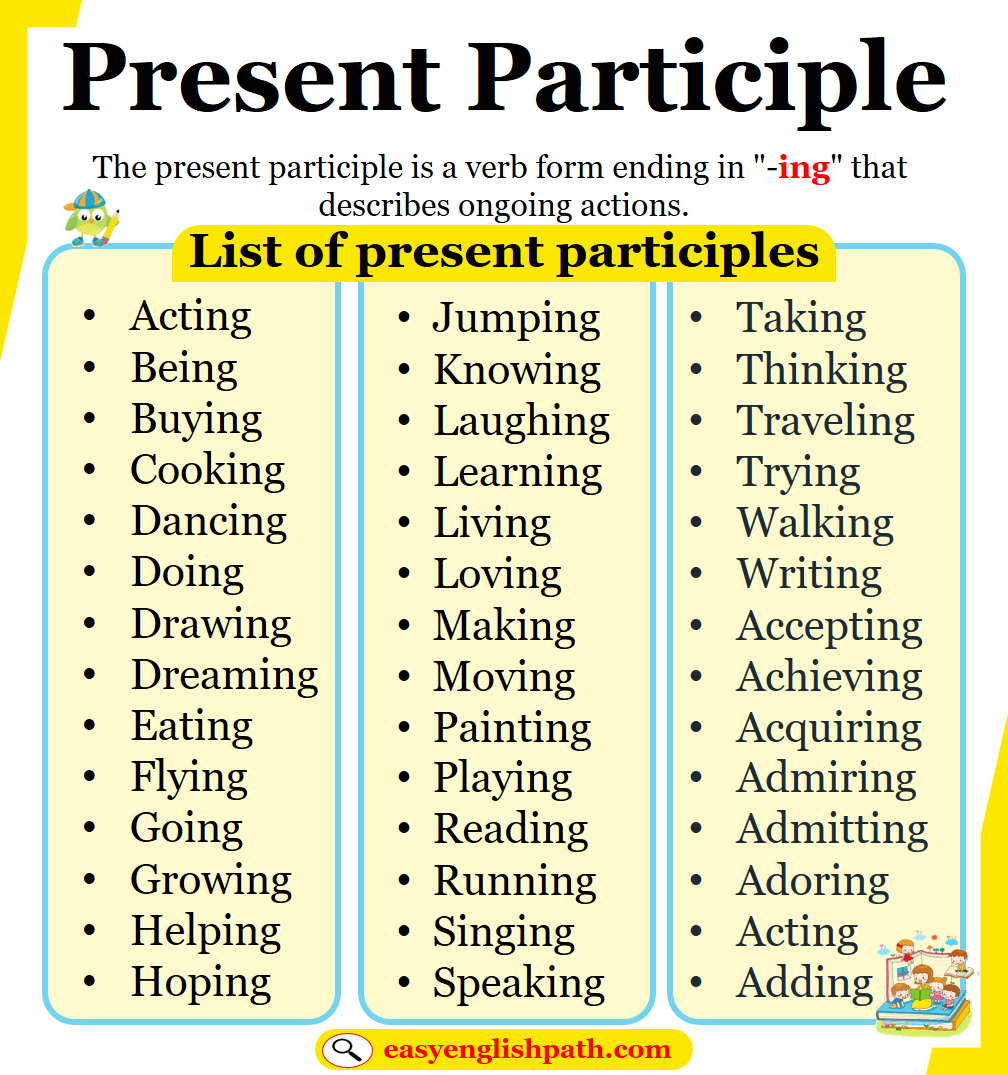A present participle is a verb form that shows an action is happening now. We make present participles by adding -ing to the base form of a verb. We use present participles to describe actions that are happening at this moment.
What Is a Present Participle?
A present participle is a verb form that ends in -ing and is used to describe an action that is ongoing or in progress. It is formed by adding the suffix -ing to the base form of a verb.
- The water is running.
- She is writing.
- The star is shining.
- He is dancing.
- The cake is baking.
How do we form the Present Participle?
The present participles of most regular and irregular verbs are formed by adding “-ing” to the base form of the verb. For example, Run becomes Running, Write becomes Writing, and Eat becomes Eating. This rule applies to most verbs, making it easy to form present participles.
1. Using Present Participle as an Adjective
A present participle can be used as an adjective to describe a noun or pronoun.
- The running water is cold.
- The smiling face was happy.
- The writing book is mine.
- The shining star is bright.
2. Using Present Participles as Verbs
While present participles aren’t used as verbs by themselves, they can be used with helping verbs to form the continuous verb tenses.
- I am writing a letter.
- She is singing a song.
- They are playing football.
- He is cooking dinner.
Present Participles and Past Participles
| Aspect | Present Participles | Past Participles |
|---|---|---|
| Form | Base verb + “-ing” (e.g., running, eating) | Regular verbs: Base verb + “-ed” (e.g., played, watched) Irregular verbs: Different forms (e.g., gone, eaten, written) |
| Function as Adjectives | Describes nouns/pronouns in a current or ongoing state (e.g., a running dog, a crying baby) | Describes nouns/pronouns that are in a past state (e.g., a broken chair, a tired worker) |
| Use in Continuous Tenses | Used with auxiliary verbs (am, is, are, was, were) to form continuous tenses (e.g., I am eating) | Not used in continuous tenses. |
| Use with Helping Verbs | Used in forming continuous verb tenses (e.g., “She is singing.”) | Used in perfect tenses (e.g., “She has sung.”) |
| Time | Describes an ongoing or current action (e.g., I am running) | Describes a completed action (e.g., I have run) |
Present Participles with Verb Tenses
1. Present indefinite Tense
| Subject | Auxiliary Verb | Present Participle | Example Sentence |
|---|---|---|---|
| I | am | eating | I am eating lunch. |
| You | are | reading | You are reading a book. |
| He/She/It | is | playing | She is playing the piano. |
| We | are | swimming | We are swimming in the pool. |
| They | are | working | They are working on the project. |
2. Past Continuous Tense
| Subject | Auxiliary Verb | Present Participle | Example Sentence |
|---|---|---|---|
| I | was | eating | I was eating lunch when he called. |
| You | were | reading | You were reading a book last night. |
| He/She/It | was | playing | She was playing the piano yesterday. |
| We | were | swimming | We were swimming when it started to rain. |
| They | were | working | They were working on the project all day. |
3. Future Continuous Tense
| Subject | Auxiliary Verb | Present Participle | Example Sentence |
|---|---|---|---|
| I | will be | eating | I will be eating lunch at noon. |
| You | will be | reading | You will be reading a book this evening. |
| He/She/It | will be | playing | She will be playing the piano tomorrow. |
| We | will be | swimming | We will be swimming in the pool later. |
| They | will be | working | They will be working on the project tomorrow. |
4. Present Perfect Continuous Tense
| Subject | Auxiliary Verbs | Present Participle | Example Sentence |
|---|---|---|---|
| I | have been | eating | I have been eating lunch for an hour. |
| You | have been | reading | You have been reading that book all morning. |
| He/She/It | has been | playing | She has been playing the piano since 2 PM. |
| We | have been | swimming | We have been swimming for three hours. |
| They | have been | working | They have been working on the project since Monday. |
5. Past Perfect Continuous Tense
| Subject | Auxiliary Verbs | Present Participle | Example Sentence |
|---|---|---|---|
| I | had been | eating | I had been eating lunch before he arrived. |
| You | had been | reading | You had been reading for an hour before you left. |
| He/She/It | had been | playing | She had been playing the piano for two hours. |
| We | had been | swimming | We had been swimming when the storm began. |
| They | had been | working | They had been working on the project all night. |
6. Future Perfect Continuous Tense
| Subject | Auxiliary Verbs | Present Participle | Example Sentence |
|---|---|---|---|
| I | will have been | eating | I will have been eating lunch for an hour by the time you arrive. |
| You | will have been | reading | You will have been reading for two hours by this evening. |
| He/She/It | will have been | playing | She will have been playing the piano for three hours by 6 PM. |
| We | will have been | swimming | We will have been swimming for an hour by the time you come. |
| They | will have been | working | They will have been working on the project for a week by Friday. |
Present Participles Examples
- I am writing a book.
- She is dancing to the music.
- They are playing video games.
- He is cooking breakfast.
- We are studying for the exam.
- The water is boiling.
- The sun is shining brightly.
- The dog is barking loudly.
- The baby is crying.
You May Also Like






